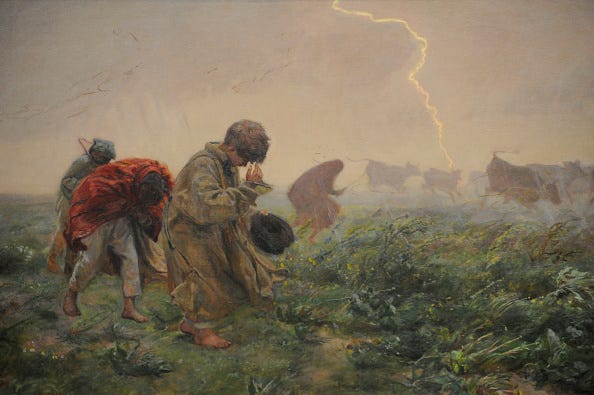The internet rarely tosses us a poem, so from time to time I will translate one that I don’t think you would otherwise see.
This one, translated from Polish, is in a style that might seem archaic, but perhaps brings a fresh thought. It is about trauma, so I thought it might be fitting for 31 May, which in the United States is Memorial Day. It is called “After the Storm,” by Maria Konopnicka, from 1902.
The titular storm is never actually described. It is between the stanzas, in the past.
Oh lord, who grants to his world the rainbow
Who lifts to bent flowers a cup from below
Who unfolds the wings of the chick in the nest
Who purples the clouds that escape to the west
By morning the village is free from all care
Here an apple tree's tended, a roof repaired there
And ere the young dawn can cast its first light
The good country folk have forgotten their fright
Oh lord, who every last trace of discord
Erases from earth by a merciful word
And stills forest's fierce cry and ocean's low moan
In the all-quiet heavens where you have your throne
Yet to the wrecked human heart, shattered by storm
Instead of the peace of the spectrum's calm glow
You give endless thunder without sound or form
Echoes of storms past, memory's woe.
Konopnicka is out of fashion now, even in Poland. The painting by Józef Chełmoński, of the same era (1896), reminds us of the sensibility.
Yet there is something sharp here: the confession in the last stanza. Her brave point is that a conceit of art, that nature expresses the soul, that outer appearances reveal inner experiences, is false. A storm means one thing in nature, and another inside a person.
So this is a poem about trauma that acknowledges God, but as something other than consolation. God and nature are on one side, and the person is on the other. The poem is not hopeless, though: by placing her predicament beyond God and nature, Konopnicka is taking responsibility for defining it herself. She does so, I think, rather beautifully.





This post motivated me to start a monthly subscription. I will continue for as long as I have the financial wherewithal and continued interest. Based on my deep appreciation for Prof. Snyder's work in Bloodlands, Blackened Earth, On Tyranny and Our Malady, I expect my interest to continue indefinitely.
Art on! Art on! Perspectives from unexpected places (including unpopular ones) beyond news and history books are enriching, enpurpling even.